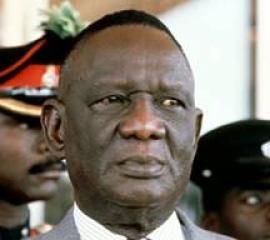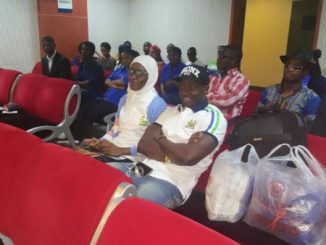
 |
| Pa. Shaki : Has Kabbah any moral authority left to criticize him ?SIERRA LEONE’S PUBLIC ORDER ACT 36( 1) C OF 1965 IS A THREAT TO DEMOCRACY , NATIONAL ACCOUNTABILITY AND NATION-BUILDING
‘FOR DI PEOPLE’ Editor Paul Kamara is now cooling his heels in prison after being jailed for a total of four years for alleged Seditious Libel against President Ahmad Tejan Kabbah. However, the democratic land has known no rest since the sentence was passed on one of Sierra Leone’s most outspoken newspapermen. And the image of the country face the prospects of hitting an all-out low if the journalist is allowed to remain behind bars . The reason is that Paul Kamara has gone to jail for a law that is 300 years old and that been repealed over 200 years ago by the very country that brought it to being-Great Britain, Sierra Leone’s former colonial master. For want of the will to turn democratic, Sierra Leone has kept this antequated , harsh and draconian law for centuries, past Independence, Republican status and the present renaissance of freedom ushered in by the crashing of the Berlin Wall and the fall of the Soviet Union. The Sedition laws which have silenced one of the most radical voices in the land are contained in Sierra Leone’s Public Order Act 36(1)C as ammended in 1965. This Public Order Act is a dangerous threat to freedom of the Press, Democracy, national Accountability and nation-Building. The Seditious libel law came into being around 1700 when many torts or private wrongs became crimes or offences against the King’s peace. They became actionable in Criminal Law .The Seditious law forbids criticizing of the government, its form, constitution . officers , laws, symbols , conduct , policies and so on and so forth. Many of Sierra Leone’s journalists who have not attended Law School fail to see the ominous trap gaping before them when they criticize their government .The spirit of the law against sedition is that any comment about the government could be construed to have the tendency of lowering it in the public esteem, an act punishable under this law. .Under Public Order Act 36(1)C , any unguarded criticism of the government could also be construed as destroying the peace. The late British Chief Justice Holt , in delivering sentence in the Tuchin case in London in 1704 , added teeth to this seditious libel law when he averred : ..”A reflection of the government must be punished because if people should not be called to account for possessing the people with an ill opinion of the government , no government can subsist. For it is very necessary for all governments that the people should have a good opinion of it ” It was therefore not sufficient for Paul Kamara to have argued that the comments made against President Kabbah were true. Indeed, if one took away the erroneous epithet that “Kabbah is a true convict”, as written by Kamara (Kabbah cannot be a convict because he did not go to jail ), most of what the journalist said were true.The Beoku-Betts Commission found Kabbah guilty of embezzling thousands of leones and he was banned from ever holding public office.However, a defence that what the accused wrote was true does not avail in this obsolete seditious libel law . Truth is not a defence under the law of seditious libel as contained in Sierra Leone’s Public Order Act 36(1)C. Infact, the greater the truth, the greater the libel. It was also therefore ridiculous to have cast any blame on the learned Judge who pronounced Paul Kamara guilty on all counts.He could not have done less. This is the venomous and dangerous aspect of this law. None charged under it goes free, once the comments attrbuted to him were proved to have been made.The spirit of the law is : “If you printed a statement that attacked a person’s reputation or impugned the integrity of a government official, you are guilty of libel , regardless of the truth or falsity of the statement “. The British realized that this seditious libel law was a refuge for dictators, incompetent public officials and anti-democratic leaders who did not want to bear the consequences of their inefficiency, incompetence and corruption.. The breakthrough came in 1792 when the House of Commons passed the Fox Libel Act , which rescued Freedom of the Press by leaving it to the jury to decide what constitutes seditious libel based on the facts and the law. America, a former British colony, which had also adopted the seditious libel law modified it as far back as 1734 during the seditious libel case of John Peter Zenger, who appealed to the jury to determine not just the fact that he had printed statements regarding the Governor’s conduct , but whether the said statements were infact true. If true, he claimed, then he should be set free because he had not committed any crime. Legal history was made as the jury upheld Zenger’s defence and set him free, setting the precedent in America for the legal dictum that the truth of a statement could be entered as a complete defence to the charge of libel. In 1798, truth became a defence against libel in the Aliens and Seditions Act of 1798. Abrams v.United States in 1919 reinforced the law . And in 1979, Smith v.Daily Mail Publishing Co., 443 U.S.97 led to the now famous Daily Mail principle , which “guarranteed the fundamental right of a free press to disseminate truthful information about public matters.” The case established the precedent that “Public officials and public figures may not recover civil damages for injury to their reputation, unless they were the victims of a reckless disregard for truth in the dissemination of a calculated falsehood “. In more bad news for public officials like Kabbah, the Milkovich v.Loren Journal Co., of 1990 even unshackled the law further when the learned Trial Judge held that “Statements not capable of being proven false, or which reasonable men would not construe as statements of facts at all but rather as mere rhetorical hyberbole , are absolutely protected by the First Ammendment. ” It is amazing that our country takes pride in still practicing a law that is 300 years old .How backward and unprogressive can our country be ! ! But trust this newspaper, the law is flourishing in Sierra Leone not because we are backward and unprogressive. The law is still active in our country because successive governments, which had skeletons in their cupboards, saw the law as an escape route and a refuge from honest scrutiny by the press. President Kabbah , a trained lawyer, will not tell any one that he does not know that this seditios libel law is so grotesque and out of place with the realities of today’s politics that it is a setback to nation-building. To hear Kabbah defending Paul Kamara’s imprisonment under this antediluvian law as a reflection of the fact that the legal process in Sierra Leone was working demonstrates that we are being ruled by a dictator who is 300 years behind time. KEEP A DATE WITH THIS PAPER FOR MORE AND NEWS OF A “FREE PAUL KAMARA NOW” CAMPAIGN TO BE LAUNCHED BY COCORIOKO.
|




Leave a Reply